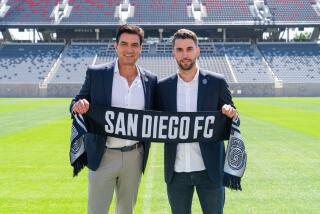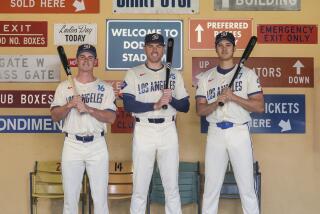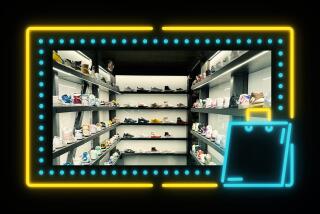2 Kids From Indio : C&C; Owners Put Together a Promising Sportswear Business and Have Fun Doing It
- Share via
It may say June, 1989, on the calendar, but it is the spring of 1990 at C&C; Inc. in Fountain Valley.
The 6-year-old company, owned by former childhood playmates Donald A. (Dac) Clark and Paul Carr, designs, produces and distributes surf and sportswear for one of the industry’s hottest labels, Gotcha, as well as for two newcomers.
In the surf-wear business, as in most of the clothing trade, work is always being done a year or more in advance.
Now is the time that C&C;’s designers begin firming up their concepts for next year’s looks. And it is the time--in the lull before the frenzy of turning sketches into product--that Clark and Carr lay plans for the future.
It is a future that appears to be as bright as the fluorescent colors of the surf wear they produce. C&C; posted nearly $2 million in profits last year on $22 million in sales and is poised for growth as it prepares to expand into several other clothing lines.
Clark said he figures that the company should be doing about $50 million in annual sales by the early 1990s.
Not bad for a couple of guys who got into the rag trade by accident.
In fact, Clark, whose father owned a small chain of retail stores in Indio, Blythe and El Centro, swore at an early age that the retailing business was not for him.
He and Carr had decided to be lawyers. To prepare for law school, Clark went off to the University of Arizona while Carr enrolled at UC Irvine.
But at the end of his junior year in 1971, Clark decided that he needed a break and drove to Orange County. He moved in with Carr and took a $1.75-an-hour job in a little jeans and camping-equipment shop in Orange, a place called the Wild West Store.
Clark never went back to school and Carr joined him at Wild West after graduating from UCI in 1972.
Ten years later, that single store had grown into a leisure-wear chain of 24 stores with annual sales of about $60 million. Carr was head buyer and Clark, no longer down on retailing, was its president.
What Wild West did, Clark said, was to largely ignore the retailing rules that said a jeans store sold only jeans and kept inventory to a minimum to limit losses caused by quick shifts in consumers’ tastes. Instead, the consumer became king as Wild West decided to carry enough stock so that everyone, of every size, could find what he or she needed, when the person needed it.
Wild West Stores also helped pioneer the now widespread formula of carrying entire lines of leisure and sportswear and accessories.
The approach worked, and Clark and Carr became wealthy when they sold their shares to General Mills when it acquired Wild West in 1981.
Clark and Carr also became members of General Mills’ corporate hierarchy, Clark as a vice president in charge of the Wild West division and Carr as general merchandising manager for General Mills. But General Mills underwent a change of direction almost immediately after buying Wild West and folded the operation as part of a corporate restructuring. In the process, Clark and Carr soured on corporate life and left in late 1983.
The valuable lesson they learned at General Mills, Carr said, “was how to make plans and think things out” before committing time and resources.
And Carr left General Mills with a plan. He had been approached by a former Wild West supplier, Gotcha Sportswear, and was asked to set up an independent company to produce a sportswear line under license.
Gotcha, a growing Costa Mesa surf-wear maker, wanted to expand from shorts and swim trunks into jeans, jackets and knit shirts.
Carr agreed to the deal, contacted Clark, and the two combined their skills and capital to form C&C; Inc. to serve as Gotcha’s domestic sportswear and accessories licensee. Gotcha retained the international license and has other domestic licensees to produce its swim trunks and some other products.
Clark and Carr attribute part of their success as distributors and producers to their experience in retailing.
As retailers, they said, they learned the importance of quality and speedy delivery and vowed as suppliers to always provide those attributes to their customers.
They also took from retailing a profound respect for the financial benefits of information management. So they immediately outfitted C&C; with sophisticated computer systems to keep track of the myriad parts of the business.
“Plus, we do complete marketing plans for everything we produce,” Carr added. “We study the numbers and the competition and the market and the pricing and work with the licensors so that when we make something, we know it will sell and we know how much will sell and where it will sell.”
It took about two years for the partners to decide that they had made the right decision by going into the production end of the clothing business, Clark said.
“We kept asking ourselves if we were having fun yet, and after 24 months of 20-hour days, we discovered that the answer was ‘yes.’ But we learned that no matter how good an idea looks, nothing is ever as good as it seems, and it always takes a lot more money and time than you thought it would to get something started.”
Underestimating the money it took to get started was probably the partners’ biggest blunder, he said.
To help the business grow, Clark and Carr eschewed salaries for the first two years, living on the proceeds of the sale of their Wild West stock. And they consistently have plowed a lot of their profits back into the business.
Late last year they added a second set of products, obtaining licensing rights to a relatively new brand of surf wear from Rusty, a San Diego surfboard designer-manufacturer.
And this year, they signed a deal with Newport Surf ‘N Sports, a Newport Beach surf shop, to create, manufacture, sell and distribute a lower-cost, less adventuresome line of surf wear.
To handle the three different lines, C&C; serves as holding company for two separate operating units. Employees wear color-coded badges that limit their access to various parts of the company’s facility and prominently posted signs remind them that those working for the Rusty line are not allowed into the Gotcha parts of the building.
It all seems confusing and will get even more complex. Clark said that C&C; ultimately would like to be licensee for five or six brands and to become diversified “so that we have more than just surf wear.”
But the two kids from Indio are having fun, and as far as Clark is concerned, leaving General Mills and the relative safety of the corporate umbrella was the best move they ever made.
“The difference between owning the business and working for someone else is huge. There is just enormous satisfaction in not having the ambiguity and discontinuity you have to deal with in a big corporation, where easy things get complex,” Clark said, adding:
“I can’t solve every problem that we have in this business, but I have good people who bring me the solutions, and the satisfaction is in being able to say, ‘You’re right, let’s do it!’ ”
More to Read
Inside the business of entertainment
The Wide Shot brings you news, analysis and insights on everything from streaming wars to production — and what it all means for the future.
You may occasionally receive promotional content from the Los Angeles Times.










